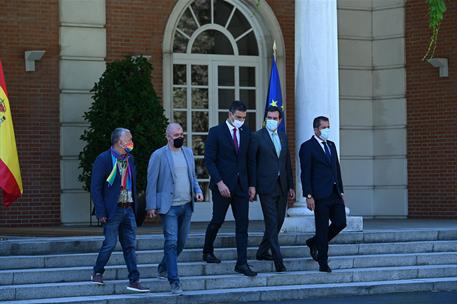Over €100 Billion has already been allocated to economic relief
The Spaniard Government and social stakeholders have signed an Agreement for Economic Reactivation and Employment, a new agreement that lays the foundations to speed up the economic recovery and create quality jobs following the crisis caused by COVID-19. This agreement comes from a vocation to achieve sound, inclusive and sustainable growth as soon as possible.
As stated by the President of the Government, Pedro Sánchez, during the event, under this agreement, “dialogue begins that must contribute to establishing our economy for the next two years. We are laying the foundations for a New Economy and we need the consensus to be as broad as possible; to do that, the role of social stakeholders is crucial”.

The signing of the agreement at Moncloa Palace was attended by Pedro Sánchez, the President of the Government; Pablo Iglesias, Second Vice-President of the Government and Minister for Social Rights and 2030 Agenda; Nadia Calviño, Third Vice-President of the Government and Minister for Economic Affairs and Digital Transformation; María Jesús Montero, Minister for the Treasury; Yolanda Díaz, Minister for Work and Social Economy; Reyes Maroto, Minister for Industry, Trade and Tourism; José Luis Escrivá, Minister for Inclusion, Social Security and Migration; Gerardo Cuerva, President of CEPYME; Pepe Álvarez, Secretary-General of UGT; Antonio Garamendi, President of the CEOE; and Unai Sordo, Secretary-General of CCOO.
The agreement aims to restart 10 industries vital to the country’s recovery
Through this Agreement for Economic Reactivation and Employment, the government, the business organizations and the trade unions seal a country commitment to urgently work towards strengthening the economic recovery and job creation. This means that meetings will be immediately stepped up within the framework of social dialogue. Furthermore, the Agreement contains more than 10 lines of work that seek to forge agreements to underpin growth and quality job creation.
On the one hand, work will be done to boost the reincorporation to companies of those workers affected by temporary lay-off plans (Spanish acronym: ERTEs) stemming from the COVID-19 crisis, prioritising capacity adjustments through working hours over job numbers. On the other hand, a commitment is taken on to develop effective mechanisms for training and new skills for workers, particularly in the digital and technology field, as well as to prepare an adequate framework for working from home.
The government and the social stakeholders also agree to address the modernisation of the labour framework to minimise the impact on jobs in future crises, and to update active employment policies.

A Pact for Industry
Another of the goals of the Agreement for Economic Reactivation and Employment is to implement a Pact for Industry that allows the country to undertake its essential re-industrialisation with the aim of diversifying, balancing and modernising the productive structure.
The Pact includes commitments to boost the “green” transition of all sectors, digitalise the economy and support the development of the social economy and the care system. Public services will also be strengthened, particularly at a health level.
The government, the business organisations and the trade unions also agreed to jointly address the necessary adaptations to enhance and guarantee the long-term sustainability and sufficiency of the public pension system, while boosting effective measures to uncover the black economy.
New programme with provision of 50 billion euros
Since the start of the crisis caused by COVID-19, the government has adopted measures at an economic and social level that have helped the productive fabric survive, along with jobs and family income. Among the measures that have contributed to maintaining the productive system alive are the mobilisation of 100 billion euros in guarantees for lines of credit from the Official Credit Institute (Spanish acronym: ICO), the establishment of a legal mechanism for Temporary Lay-Off Plans, the extraordinary provision for the self-employed for cessation of activity and the implementation of the Minimum Living Income for the most vulnerable groups.

The ongoing assessment of the Spanish economy made by the government has meant that the measures adopted in an initial phase have been strengthened by action plans for tourism and the automotive industry, the extension until 30 September 2020 of the mechanism to protect workers and companies under an ERTE, and the extension of the mechanism to protect the self-employed
Three and a half months after the outbreak of the pandemic, and to complement these reactivation measures, the government is immersed in the reactivation of the Spanish economy. To that end, on Friday a second programme of public support for solvency and business investment has been introduced for the sum of 50 billion euros. This programme consists, on the one hand, of a Fund to Support Solvency, with a provision of 10 billion euros, which will be invested in those companies that are strategic for the productive fabric. On the other hand, a new specific line of ICO guarantees will be set up with an investment of 40 billion euros.
This programme is geared towards boosting growth, to strengthening solvent companies in strategic sectors whose financial situation may be vulnerable due to COVID-19, and to boosting internal demand – necessary levers to reactivate economic activity and create jobs.









